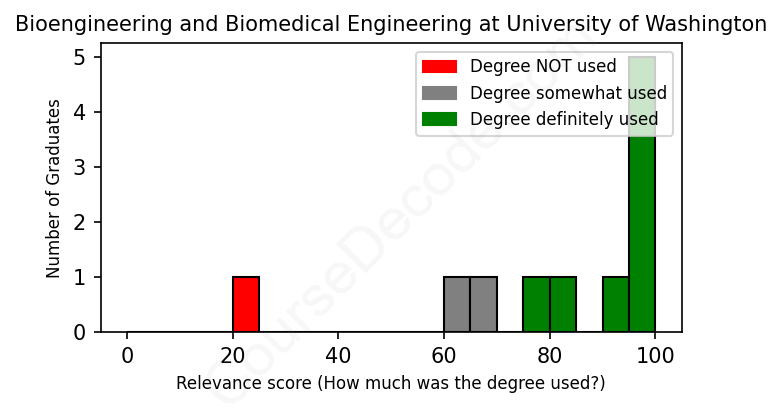
First, some facts. Of the Bioengineering and Biomedical Engineering graduates from University of Washington we've analyzed , here's how many have used (or NOT used) their degree in their career:

These are estimates based on AI analysis of 11 LinkedIn profiles (see below).
The verdict? Significantly above average. Overall, with an average relevance score of 82%, Bioengineering and Biomedical Engineering graduates from University of Washington have a much higher likelihood (+15%) of finding work in this field compared to the average graduate across all fields:
And for comparison, here's the chart for all profiles we've looked at across all degrees.
Also, after graduating, 81% of these graduates have pursued further education other than another Bachelor's degree (such as a Masters degree or other), compared to the average across all profiles of 35%. This suggests you may need more than just a Bachelors degree to be competitive as a Bioengineering and Biomedical Engineering graduate.
See the details:
|
Relevance score: 93% We think this person has gone into a career highly relevant to their degree. We think this person has gone into a career highly relevant to their degree.
DEGREE INFOGraduated in 2010 from University of Washington with a Bachelor of Science (BS) in Bioengineering and Biomedical Engineering. Also pursued further education since (see below). JOB HISTORY SINCE GRADUATIONStanford at the Tech Participant The Tech Museum May 2012 - Dec 2012 Postdoctoral Research Fellow  Massachusetts General Hospital 2015 - 2018 Instructor in Investigation  Massachusetts General Hospital Nov 2018 - Present FURTHER DEGREES DONE SINCE GRADUATINGDoctor of Philosophy (PhD)Stanford University 2010 - 2015 Master of Science (MS) Stanford University 2012 - 2013 ABOUTNo information provided. |
The top 10 most common jobs done by the graduates we've analyzed (ranked most common to least) are:
Based on the LinkedIn profiles analyzed, it seems that many graduates from the University of Washington's Bioengineering and Biomedical Engineering programs have landed roles that are closely related to their studies. A significant number of individuals have taken up positions such as Research Scientists, Clinical Fellows, and Postdoctoral Research Fellows, which directly apply the biomedical concepts and techniques they learned during their degree. These roles often involve engaging in medical research, working with clinical applications, or developing biomedical technologies, demonstrating a clear linkage to their educational background.
However, not all jobs held by these graduates maintain a strong connection to bioengineering and biomedical engineering. Some roles, like those in general healthcare practice or positions that focus on unrelated fields—such as recruitment or product management at non-biomedical firms—do not effectively utilize their specific engineering knowledge. While these experiences can still be valuable for skill development and career advancement, they are often only tangentially related to their degree. Overall, it’s fair to say that while many of these positions are relevant to their educational foundation, there is also a noticeable number that veers off into different directions, showcasing the versatility of their skills but not necessarily aligning with their specialized studies.
Here is a visual representation of the most common words in job titles for Bioengineering and Biomedical Engineering graduates (this is across all Bioengineering and Biomedical Engineering graduates we've analyzed, not just those who went to University of Washington):

When you look at the career trajectories of graduates from the Bioengineering and Biomedical Engineering programs at the University of Washington, a clear pattern emerges. Many of them start off in roles that are closely tied to research or healthcare shortly after graduation. For instance, many recent graduates have taken positions as research scientists, clinical fellows, or even medical residents. These first jobs tend to set a strong foundation in their respective fields, allowing them to gain practical experience while building valuable networks within the biomedical community.
Fast forward five to ten years, and you'll see that a significant number of these individuals continue to thrive in the field. They transition into more advanced roles, such as postdoctoral researchers, clinical specialists, and even department leads in various medical institutions. Some have ventured into managerial and strategic roles in well-known organizations like McKinsey and the Bill & Melinda Gates Foundation, indicating a shift towards the intersection of healthcare and business. While there are a few who seem to have diverged into roles that are less directly related to bioengineering, such as recruitment or general consulting, the overarching trend suggests that many of these graduates are carving out successful and relevant careers in bioengineering or related fields. Overall, it appears that a degree from this program is a strong starting point for a fulfilling career in biomedical applications, research, and even healthcare leadership.
Getting a Bachelor’s degree in Bioengineering or Biomedical Engineering at the University of Washington is definitely on the challenging side, especially if you're not super into math and science. You’ll be diving deep into subjects like biology, chemistry, physics, and systems engineering, which can be pretty demanding. The coursework often involves a lot of heavy-duty problem solving and team projects, especially in labs and design classes. While it's totally doable with the right mindset and study habits, you should be ready to put in some serious effort if you want to keep up and really understand the material. So, it might not be the easiest degree out there, but if you're passionate about the field, it can be really rewarding!
Most commonly, in the LinkedIn profiles we've looked at, it takes people 4 years to finish a Bachelor degree in Bioengineering and Biomedical Engineering.
So, looking at these graduates from the University of Washington, it seems like many of them, especially those in clinical or high-level consulting roles, are likely making a decent amount of money. For instance, you have physicians and researchers who tend to earn good salaries, especially as they gain experience, and positions at places like the Bill & Melinda Gates Foundation usually come with competitive pay. Some others, like those in the earlier stages of their careers or in internships, might not be raking it in just yet, but they’re building experience in strong fields which can set them up for higher earnings in the future. Overall, it looks like most of these folks are on track to do pretty well financially!
Here is a visual representation of the most common words seen in the "about" section of LinkedIn profiles who have a Bachelor degree in Bioengineering and Biomedical Engineering (this is across all Bioengineering and Biomedical Engineering graduates we've analyzed, not just those who went to University of Washington). This may or may not be useful:

Here are all colleges offering a Bachelor degree in Bioengineering and Biomedical Engineering (ordered by the average relevance score of their Bioengineering and Biomedical Engineering graduates, best to worst) where we have analyzed at least 10 of their graduates:
| College | Score | Count |
|---|---|---|
 Clemson University Clemson University
|
88 | 16 |
 University of Washington University of Washington
|
82 | 11 |
 University of California, Los Angeles University of California, Los Angeles
|
72 | 10 |